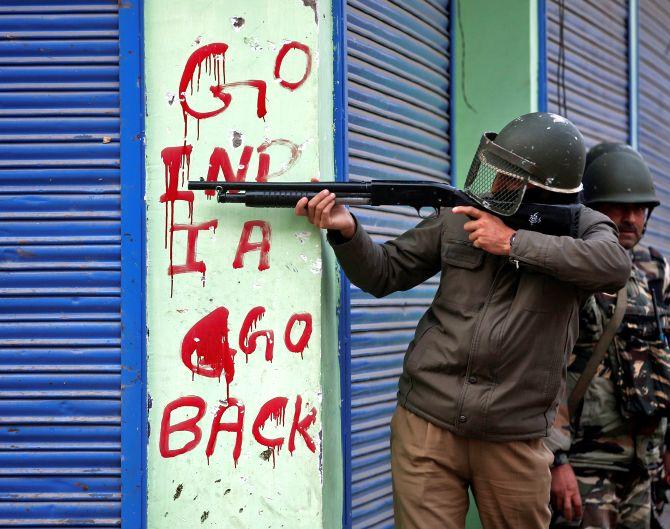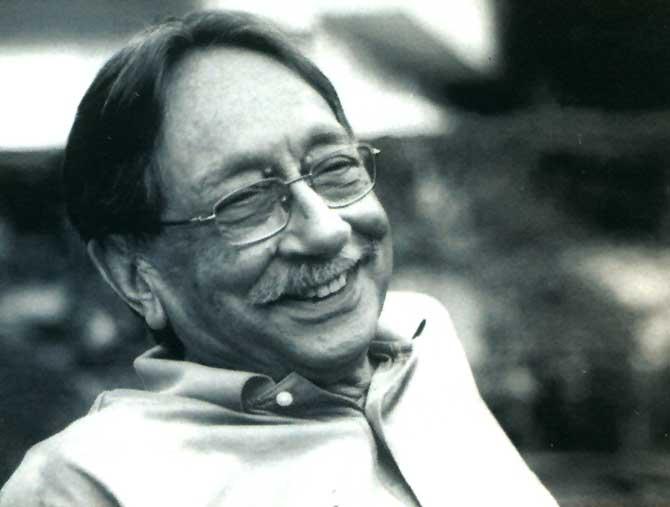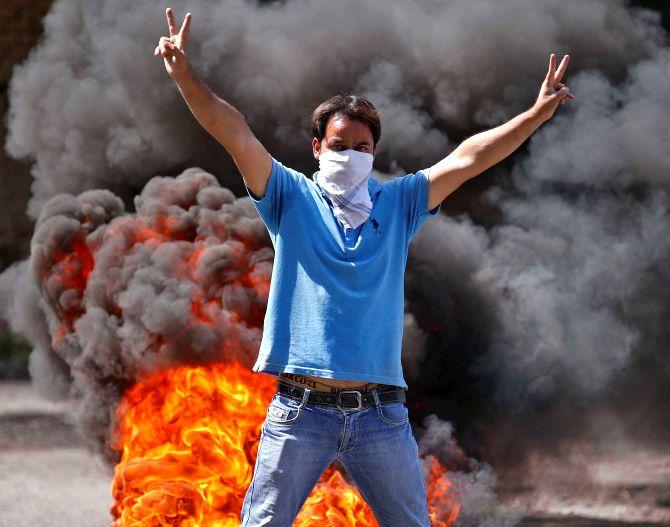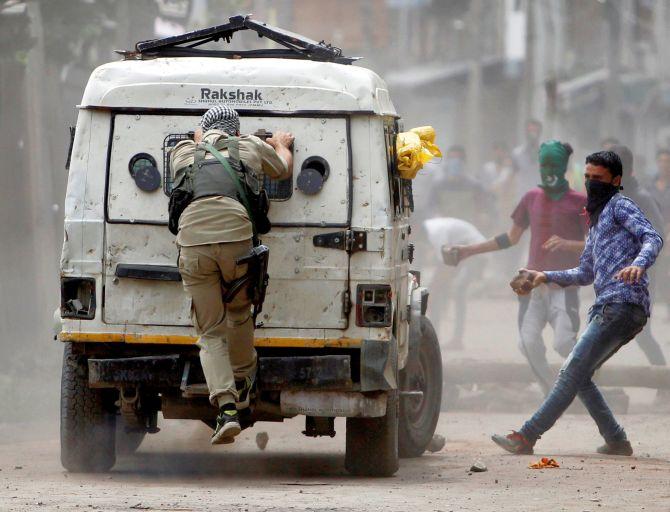'Engagement should never stop.'
'Reassure Kashmiris that they will be treated at par with the rest of India.'
'The peace you crave will be peace with honour.'
'Your special status will not be tinkered with.'

The Kashmir valley saw almost five months of shutdown following the killing of Hizbul Mujahideen terrorist Burhan Wani on July 8. Photograph: Danish Ismail/Reuters
After five months of unrest, Kashmir finally saw calm and peace last week after separatists called off the shutdowns in Kashmir.
Pervez Majeed spoke to former Research and Analysis Wing chief Amarjit Singh Dulat, who is known for his deep understanding of the Kashmir issue and has been credited with establishing a channel of communication with reluctant separatists and bringing them to the dialogue table.
 In this candid conversation, Dulat, left, criticises the Narendra Modi-led government for the way it has handled the Kashmir crisis and stresses the need to "talk to Kashmiris about Kashmir."
In this candid conversation, Dulat, left, criticises the Narendra Modi-led government for the way it has handled the Kashmir crisis and stresses the need to "talk to Kashmiris about Kashmir."
There is a view in political circles that violence erupted in the valley again because the central government adopted a hardline posture and snapped all channels of communication and tried to stifle dissenting voices in Kashmir. What is your view?
On the surface, chaos broke out in the valley owing to the killing of Burhan Wani; but he was no Osama bin Laden.
There was an undercurrent of resentment because of the absence of engagement with Kashmiris and that lava of resentment erupted through Burhan Wani's killing.
I have always felt, and perhaps it's because of my closeness with then prime minister Atal Bihari Vajpayee, that talks should take place.
If you don't do so today, you will have to tomorrow.
There is no way out.
We have to talk to the Kashmiris as well as to Pakistan. This is very clear.
It is very sad whatever happened this summer.
I was in Srinagar in June and I felt that something good will happen this time around. Tourists were coming and people were happy.
This was the appropriate time for Delhi to talk to the Kashmiris.
Now, we have more Kashmiris and more security personnel being killed, infiltration and militancy have increased, Pakistan has got more into things as it had lost the game in Kashmir.
But now we hear things are getting better and I hope the Centre initiates a serious dialogue process.
Do you mean the Centre's policies made Pakistan relevant in Kashmir again?
(Emphatically) When we do not talk to Kashmir and Kashmiris, then Pakistan becomes more relevant.
This is because the Kashmiris have always considered Pakistan to be their fallback option.
This all comes out of frustration, disgruntlement, that's why we saw this anger and alienation on the streets. That makes Pakistan relevant.
When Delhi ignores them (Kashmiris), and takes them for granted, they wave green flags.
But waving green flags does not mean they hate India and admire or have any fascination for Pakistan, rather it is a signal to seek Delhi's attention.
If people in Delhi do not recognise that signal, the results are obvious.

So based on your experience, what should be done?
The great Vajpayeeji believed that we have to talk to Kashmir, and with Kashmiris. He and his colleagues in the government were clear in their understanding.
They understood that permanent confrontation is not a solution to Kashmir and that we have to move on Kashmir instead of trying to ignore or avoid it.
This government has to realise this too.
Do you mean the Modi government doesn't realise it?
I believe Modiji's government is more powerful than Vajpayee's.
When he became prime minister, Kashmiris welcomed that, because they were hoping he has the mandate and will take bold steps on Kashmir on the lines laid by Vajpayee.
They expected and wanted this government to carry forward the Vajpayee approach on Kashmir.
But, unfortunately on Kashmir, the Modi government has only paid lip service to Vajpayee's policy. That is the sad part.
Is the central government responsible for whatever has taken place in the past five months in Kashmir?
I think Pakistan, the Centre and state governments -- all are responsible for what happened.
I, also, hold the Kashmiris responsible for the situation.
Take a look at the Hurriyat, what do they have to offer other than hartals?
Do they have any tangible agenda to offer to the people?
I am really surprised why Delhi is not talking to Kashmir or the Kashmiris...
It is very sad that nobody is even talking to Dr Farooq Abdullah. He has been a chief minister thrice, and even a Union minister. He is the biggest leader in Kashmir and a huge nationalist too.
Delhi should not forget Farooq Abdullah.
If nobody is talking to him, then we have to say that something is wrong with us -- we have a mental block.
There is a belief that by refusing to invite the separatists for talks and adopting a hawkish approach towards Pakistan, the Centre has undone all that you achieved vis-a-vis Pakistan. Is that true?
See, it was not my work, it was all because of Vajpayee.
It is very unfortunate that Modi hasn't done what was expected of him vis-a-vis Kashmir. He didn't move forward.
I think they still have time. They have two-and-a-half years.
Maybe Modiji will again become the PM. They have the opportunity to move forward in Kashmir.
What should they do?
Baatcheet, engagement...
Engagement should never stop. And reassure Kashmiris that they will be treated at par with the rest of India.
The peace you crave will be peace with honour.
Your special status will not be tinkered with.
The Government of India needs to assure the Kashmiris that Article 370 will not be touched.
Some critics say your book (Kashmir: The Vajpayee Years) has focused on two political families of Kashmir -- the Sheikh Abdullah family and the Mirwaiz family.
I have written what I thought is a fact. I reiterate that the two leaders who will matter in the immediate future are Umar Farooq and Omar Abdullah.
I have always been saying that among the separatists Mirwaiz has a future. He is young, age is on his side, he has a constituency, he is the Mirwaiz, he is forward looking, he controls that mosque area... everything is in his favour.
But yes, by just sitting in a mosque is not going to help. He has to decide whether he wants to be pope for lifetime or do something for his people.
Home Minister Rajnath Singh's all-party delegation to Kashmir received a cold response as most people refuse to meet him. Some people say their approach was wrong.
I don't know how they approached them (the separatists), but I don't know why the Hurriyat didn't meet them.
If the Union home minister went there and showed an inclination to talk, they should have met that delegation.
A delegation led by Yashwant Sinha visited Kashmir twice and met with separatists and other sections of society.
However, they say they are a non-political initiative. Do you know anything about that?
Mr Sinha says he has come on his own, but I can't believe that such a serious person who has been a foreign and finance minister can go just on his own.
I think there must have been some signal from somewhere. And if that's the case, then they should carry on.

The five months of unrest saw several lathi charges and use of pellet guns by security personnel leading to several debates on the use of such weapons against the public. Photograph: Danish Ismail/Reuters
How do you view the relationship between the Kashmir and Jammu regions post the BJP-PDP alliance in government?
It was a great opportunity to bring Jammu and Kashmir closer, but they instead drifted away.
The CM had to walk out of a cabinet meeting. This is not heard of.
There is something wrong. Despite the fact Mehboobaji is close to the Centre, there is still tension.
There is talk in political and diplomatic circles that the 'Doval Doctrine', by National Security Advisor Ajit Doval, advocating a hard line policy on Pakistan, is pushing it closer to China, which, in turn, gives rise to an atmosphere of a cold war. What is your view?
What I can say is I know him as a professional. I don't know what his doctrine is, if any, but he is a thorough professional.
He is now the NSA and I think he understands the local and international dynamics of the approach of handling Pakistan.
Regarding the surgical strikes, was something similar conducted when you were R&AW chief?
See, the surgical strikes have been hyped too much.
Whatever the surgical strikes mean, we always have this kind of movement on the borders...
Sometimes they do and sometimes we do.
I think we should not have talked about it as much as we did.
Pakistan didn't react to it; the only reaction from them was that nothing has happened, so it didn't bother them.
Our DGMO (Director General of Military Operations) said surgical strikes have been conducted and he won't say anything beyond that, it was a sensible approach.
Unfortunately, because of the hype of the surgical shrikes, the border has been unnecessarily heated up.
We should think of how we can have a ceasefire like that of 2003, how to revive that.
We should focus our attention on talks and a ceasefire on the borders.
There is a perception that in the Modi government all power wrests with the PMO.
In such a scenario do you think the intelligence agencies may not be free to work?
Our agencies are thoroughly professional. They do not work on anybody's dictum.
Of course, the government always has to provide direction, but intelligence agencies work in their own way.











 © 2025
© 2025